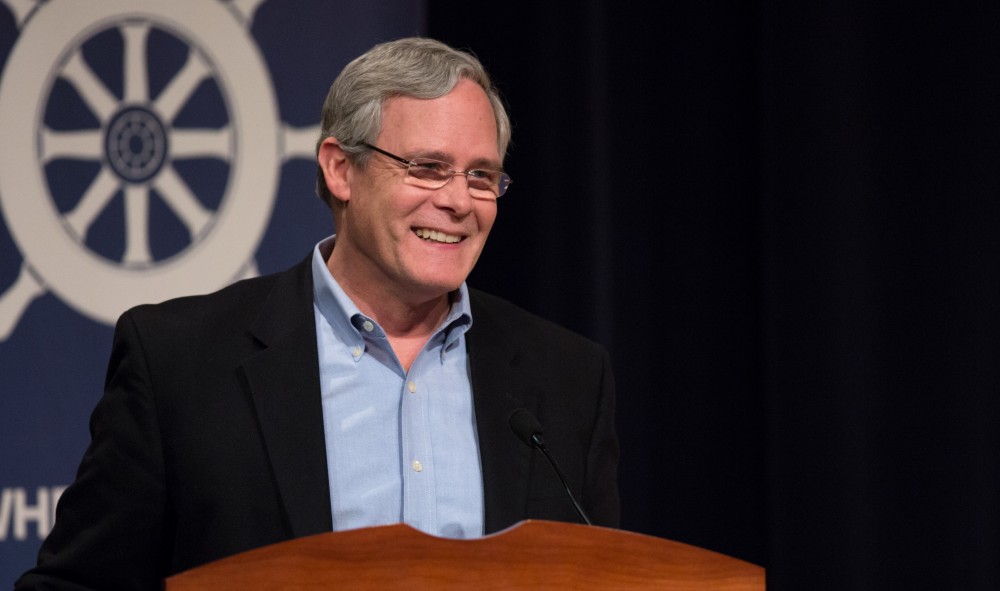Hauenstein Center kicks off Wheelhouse Talk series with presidential election event

GVL / Kevin Sielaff – Gleaves Whitney pays tribute to Ralph Hauenstein before the start of Senator Warren’s wheelhouse talk at Loosemore Auditorium on Grand Valley’s Pew Campus Jan. 22, 2016.
Oct 10, 2016
With the widening gap between progressive and conservative viewpoints, creating an open forum to inspire intellectual and political diversity is necessary in confronting the challenges Americans face within the upcoming presidential election.
In order to establish a common ground for political talk, Gleaves Whitney, the director of Grand Valley State University’s Hauenstein Center for Presidential Studies, led the kickoff event for the center’s Wheelhouse Talk series, at GVSU’s Loosemore Auditorium Friday, Oct. 7.
From 4 p.m. to 5 p.m., Whitney’s presentation focused on the rapidly devolving political environment and the different ideals of modern American society as described by Donald Trump, Hilary Clinton and Bernie Sanders.
“Election 2016 has unloosed a cascade, a Niagara, of uncertainties,” he said. “There’s anxiety because we are bracing ourselves for a major political realignment. The storm clouds of this realignment has been gathering on the horizon like Hurricane Matthew. We don’t know what the outcome is going to be.”
Living amidst a digital revolution as far-reaching as the French and the industrial revolutions, Whitney emphasized how those individuals who are not able to access or manipulate the benefits of the digital age are more susceptible to radicalized left or right wing talk.
“The truck drivers, the janitors, the hotel maids, the people who fold clothes, if they are not part of this digital revolution they may become part of a counter-revolution and tear down what they cannot build up,” he said.
Reflecting on if conservative, progressive and socialist movements can work together to find a principled common ground within the U.S. after election day in November, Whitney emphasized how millennials in the U.S. have the responsibility to transform the outcomes of the election.
With over 32 percent of eligible voters being millennials, Whitney said college students have the chance to revolutionize a new age of political thought and ideals.
Examining the extent of how a well-rounded education could effect how students engage within politics and voting, Whitney said a liberal arts education provides students the chance to adapt, analyze and think critically when finding a common ground in political or academic talk.
“A liberal education makes our lives richer, enormously richer” he said. “Sooner or later, every thoughtful person has to grapple with meaning and mortality, principle and purpose.”
During the question and answer portion of the presentation, GVSU President Thomas Haas asked a question about systems of the government within the U.S.
“The executive, the legislative, the supreme court, where are we going and is that a place of common ground?” Haas asked.
In response, Whitney said it is not just the power of executive orders that individuals are fearing, but the power of social media.
Emphasizing how social media can now threaten a primary and people on Capitol Hill with only one Twitter post, Whitney said it is down to the public to be vigilant and see if there is a breakdown between the parties as a result of social media usage.
“The power of social media is to move masses of people and create virtual equivalents of mobs,” he said. “As people come alive to that kind of chaos, we will have the chance to seek common ground.”
Even in a time of criticism and political confusion, Whitney said it is important for voters, especially students at GVSU, to rise up, question the establishment and bridge the gap so political diversity could be discussed in an open forum.
“Students, you may only be 10 percent of our population, but you are 100 percent of our future,” Whitney said. “As you seek out the heroic role you will play as leaders, wow us with your energy and idealism and your hard work.
“Go forth and dare to great things.”

























